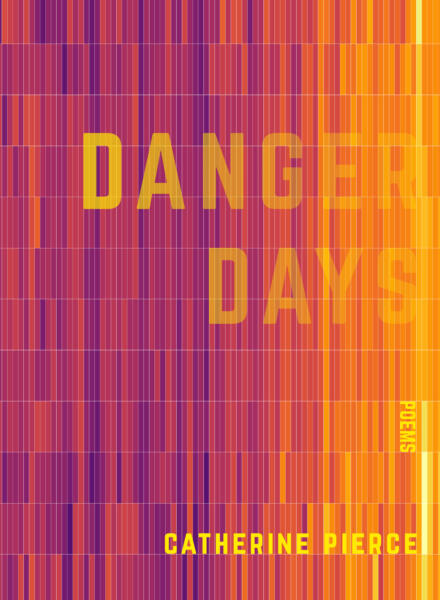Hannah V Warren: Two of my favorite poems in this collection, “Fable for the Final Days” and “Please Let It Be Aliens,” are apocalyptic mirrors, showing us our own faults and the inevitable resulting crash. These poems appear as the first two in your book’s third section—the beginning of the end, if you will. Can you speak to how you see these poems working alongside one another, both in terms of content and in terms of placement within Danger Days?
Catherine Pierce: Both of those poems take an outside-in sort of approach—imagining how someone from the distant future or another planet might conceive of our civilization and damaged earth. It felt important to pan back from my own insular daily low-grade panic and approach these fears from different angles.
In terms of the poems’ placement: the book’s structuring was done at least in part on a gut level, but certainly the poems in the last section grapple directly with this time and the possible future ramifications of it. These poems start the third section with a broader acknowledgement of our planet’s dire situation—a necessary grounding before the book’s final poems become calls for hope and action.
HVW: Some of the most intriguing poems in Danger Days are the ones that speak from so many voices, the ones that invoke the we, the us. What instigated your development of the collective voice in these poems? If the we were to congregate, what would they look like?
CP: This collection has to do with the personal, of course, but also with the understanding, especially now, that personal doesn’t mean individual or isolated. Everything—climate crisis, social injustice, the Supreme Court—is personal. So there would be a lot of the we. And I think we would look steely, love-staggered, angry, fallible, resolute, and—again, and maybe not on every day—hopeful.
HVW: These poems are so deliciously descriptive, and the strangest creatures, objects, and impulses appear in the pages. When researching for this collection, what was your most fascinating discovery, your favorite fact?
CP: Oh, it was definitely the moment when I read an article detailing all of the garbage on the moon. I was truly shocked. I’d thought, naively, that there was a flag there and maybe some golf balls. I’d had no idea how many, many things humans had deposited on the moon. So maybe not favorite fact, but most fascinating discovery, for sure.
HVW: Which poem started this collection? What idea, what notion?
CP: This collection changed and evolved so much over time, but really started to take shape as the book that it ultimately became with “Poem for Right Now,” which I wrote on Inauguration Eve in 2017. I had so much anger and outrage and love and wanting, and pretty soon this book had all those things, too.
HVW: These poems are steeped in spellwork. In “Dear Place, I Ask So Much,” you write, “What incantation can I weave for you? / What spell can I spin to glacier you // again blue and unending.” If your book were a grimoire, if I were to read the poems as spells with moonwater and rocksalt and sweet incense—if the only lights were candles—what do you imagine would arise?
CP: This is the best question ever. What would arise…I think maybe a forest, a vast dark forest where each tree’s leaves are made of a different element: leaves of flame, leaves of water, dirt-leaves, leaves of wind. We could rest in that forest—rich loam, soft ferns—but only if we tend to it. It requires a lot.
Hannah V Warren is a doctoral student at the University of Georgia where she studies poetry and speculative narratives. Her chapbook [re]construction of the necromancer won Sundress Publications’ 2019 chapbook contest, and her works have haunted or will soon appear in Passages North, Mid-American Review, Moon City Review, and Redivider.
